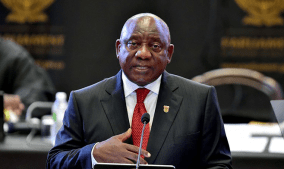Concerns are being raised about the constitutionality of the Traditional and Khoi San Leadership Bill which President Cyril Ramaphosa recently signed into law.
For the first time, the Act gives statutory recognition to the Khoi and San communities.
It also aims to align Khoi and San institutions with the Bill of Rights.
Although some have welcomed the new legislation, its constitutionality may well be challenged.
Watch the video for more on the story:
Spokesperson of the Khoi and San royal house Belinda Peterson says they acknowledge the flaws in the Act but describes it as a work in progress.
She says the signing of the Act is in the right direction to form part of this democratic government.
“We’ve been standing outside for a very long time and to be part now is very historical.”
Meanwhile, the Land and Accountability Research Centre has questioned what it terms the far-reaching powers that the Act has given to traditional leaders. It says two reports have warned of issues of constitutionality.
The Kgalema Motlanthe High-Level Panel and the President’s own Advisory Panel into Land Reform compiled the reports, respectively. The centre’s Director Nolundi Luwaya says they may consider legal action at a later stage.
She, however, says for now they want to help communities to understand the implications of the legislation.
“Now, our disappointment (is) in the fact that the President signed the Act and didn’t refer it to the Constitutional Court. As he can under the Constitution, is that we’re very concerned with the evidence that exists currently, that shows that traditional leaders do actually use the powers that they have in ways that abuse people’s land rights. “
Researcher and Analyst Nomboniso Gasa shares the same sentiments as Luwaya.
Gasa says the bill has sections that render it unconstitutional.
“Section 23 deals with the powers of traditional leaders and rural communities particularly with communal land rights. In Section 23, it says that they should consult PIRA, the interim protection for informal land rights and these rights are the rights that affect people who live in rural communities, their communal land rights. The rights that say people who live in rural areas, who live in customary land, who live in their ancestral land, that their rights are protected by the constitution, that they cannot be disposed or dislocated from that property. This bill does not protect those rights.”
Watch the video below for more on the story:






